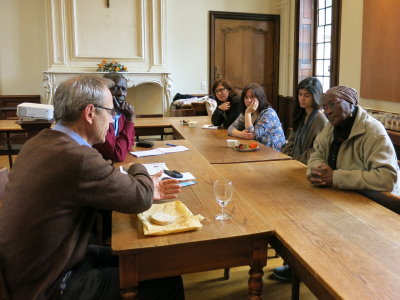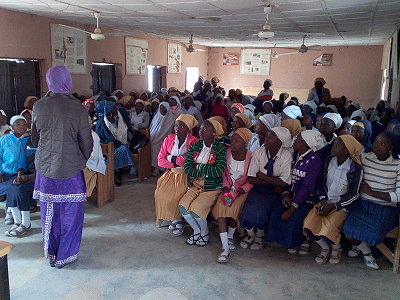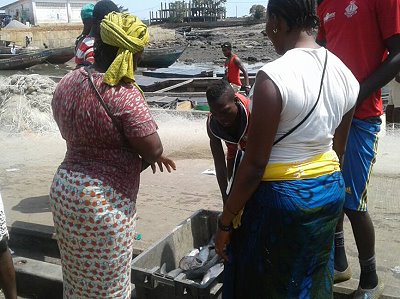 "Food security exists when all people, at all times, have physical, social and economic access to sufficient, safe and nutritious food which meets their dietary needs and food preferences for an active and healthy life." as defined at the FAO World Food Summit in November 1996.
"Food security exists when all people, at all times, have physical, social and economic access to sufficient, safe and nutritious food which meets their dietary needs and food preferences for an active and healthy life." as defined at the FAO World Food Summit in November 1996.
We produce globally enough food to feed everybody well, while close to 800 million people are estimated to go hungry according to World Hunger Statistics of the Food Aid Foundation, down from almost one billion undernourished people a few years ago. This still means that one in nine of the global human population does not have enough food to lead a healthy active life.
On the other side of the economic divide, between 30 and 40% of food produced and bought in industrialised countries never makes it onto the plate and is dumped as waste! In other words, we may not have as much as production problem as we do have a distribution and access problem.
Stella Williams from Nigeria, Aliou Sall from Senegal and Cornelia Nauen from Belgium/Germany were resource persons to a lunch debate at the Hollands College of the KU Leuven moderated by Patricia Morales. The conversation illustrated what that means on the ground in some African countries.
Examples from Nigeria showed how the low social status of girls and women and their weak formal education in the North of the country are major obstacles in making families food secure - and particularly women and girls within families.
 These examples were based on recent field work of Prof. Williams in the Kaduna and Lagos States, Nigeria, in January 2018. The situation was discussed in the wider context of the interrelated Sustainable Development Objectives (SDG) with emphasis on the crucial importance of advancing on education for girls and women as well as providing better health and livelihoods services. This is also closely linked to pushing for gender equality to achieve SDG2 Zero hunger and food security, in turn linked closely to SDG 1 to eradicate poverty. This was recently also highlighted by former UN Secretary General Kofi Annan in Nature.
These examples were based on recent field work of Prof. Williams in the Kaduna and Lagos States, Nigeria, in January 2018. The situation was discussed in the wider context of the interrelated Sustainable Development Objectives (SDG) with emphasis on the crucial importance of advancing on education for girls and women as well as providing better health and livelihoods services. This is also closely linked to pushing for gender equality to achieve SDG2 Zero hunger and food security, in turn linked closely to SDG 1 to eradicate poverty. This was recently also highlighted by former UN Secretary General Kofi Annan in Nature.
A less dramatic example concerns field work in Guinea by Dr. Sall, where interviews with male and female leaders in the local artisanal fisheries provides indications how the effects of globalisation of markets in fisheries products risk to undermine food security and previously ample supplies under local control.
The massive investment of Chinese, Korean and Lebanese investors not only leads to price increases, but also affects the social organisation within the fishing industry. This is putting women at a serious disadvantage compared to their previous roles as entrepreneurs with risks to their independent income, which normally feeds the entire family and provides the essentials for the household. Massive exports of high value fish through the foreign investors also leaves the local market undersupplied. Consumers are already buying less and smaller pieces, because they can not afford more of their preferred fish species. As yet, there are still cheaper small pelagics available, which are not the preferred species, but have good nutrional value.
 All this impinges on food security, though it would be inaccurate to equate declining landings for local consumption automatically with food insecurity. The price hikes for consumers and the break-up of strong entrepreneurial roles for women do, however, create new pressures as it is currently unclear that losses of purchasing power in the fishery can be compensated in other areas.
All this impinges on food security, though it would be inaccurate to equate declining landings for local consumption automatically with food insecurity. The price hikes for consumers and the break-up of strong entrepreneurial roles for women do, however, create new pressures as it is currently unclear that losses of purchasing power in the fishery can be compensated in other areas.
One participant argued for using social marketing approaches to raise awareness about the plight of coral reefs which might disappear by mid-century under most scenarios of ocean warming and climate change. That would not only jeopardise perhaps the most productive ecosystems on Earth, but also have serious consequences on marine food production and much else.
The debate moved between arguments in favour of incentives, moral appeals, stricter rules and their enforcement and longer-term effects of education, while not forgetting practical steps within reach here and now.
The task identified is huge and similar to other grand challenges of our times: how to break unsustainable habits of humankind? How to reconnect humans with nature and the life-support system Earth, especially in industrialised countries which overuse renewable resources? Avoiding to live beyond our means has still a different flavour in a rich country compared to one, where even basic needs of people, such as food security are not yet met. Quite a heady mix to be pursued further in future occasions.
Mundus maris thanks Bart Pattijn and Jelle Zeedijk, respectively Director and Secretary of the Centre for Ethics, for the kind welcome and hosting.









